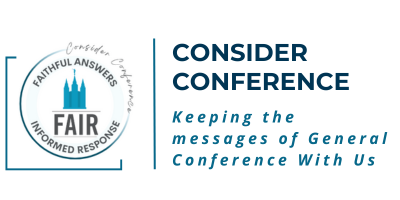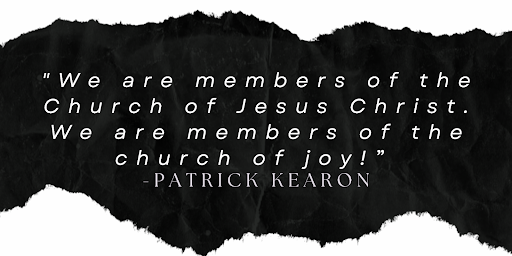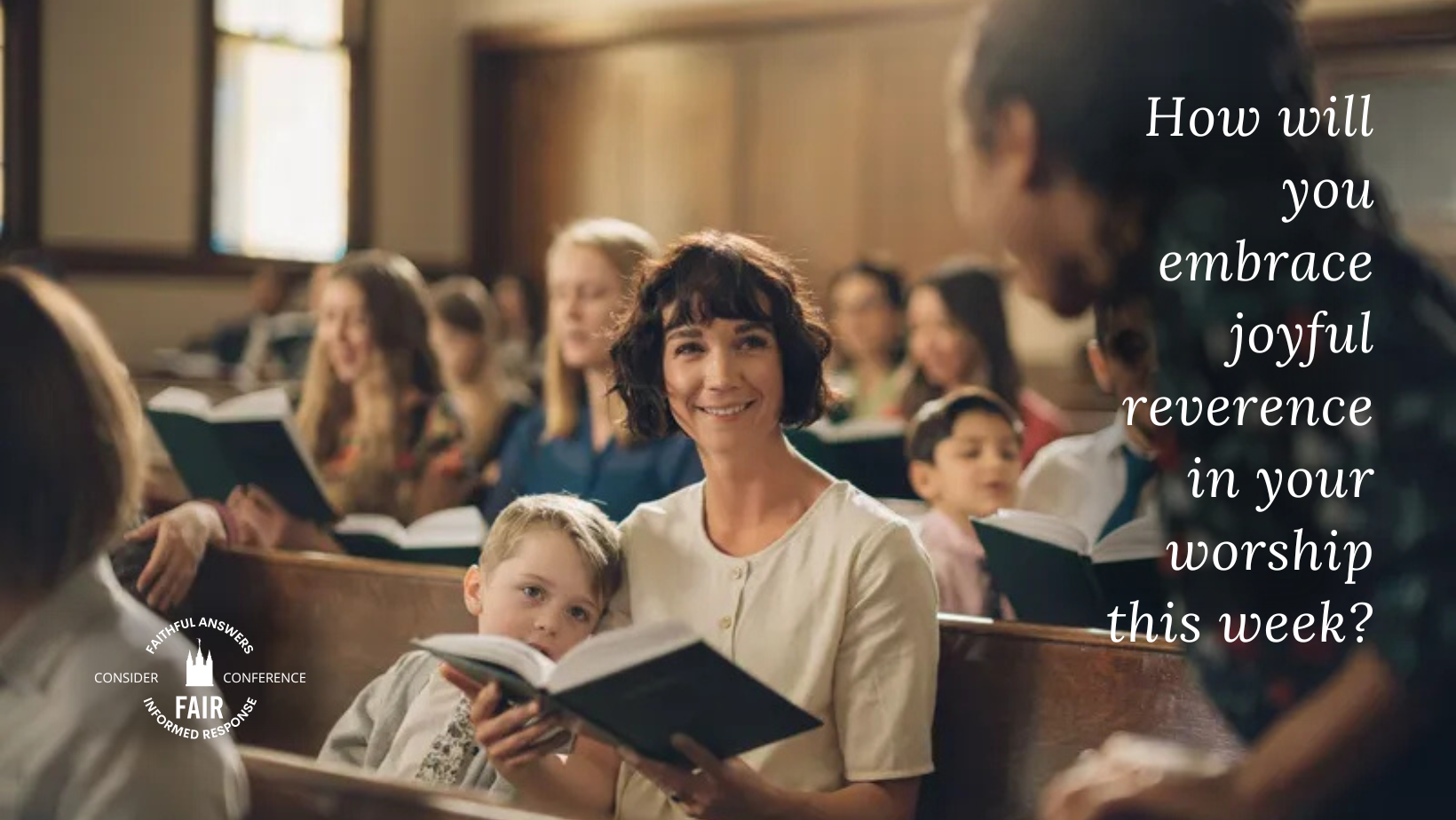
In a world where “happiness” often seems fleeting, Elder Patrick Kearon’s talk “Welcome to the Church of Joy” offers a profound answer to one of life’s biggest questions: How can we find lasting joy? His talk addresses foundational gospel principles like the Plan of Salvation, agency, and the essential nature of organized worship as pathways to joy. Elder Kearon asserts that true joy flows from understanding God’s plan, reverencing Christ, and gathering as an organized church to partake of the sacrament. Let’s explore how these principles answer common questions and critiques about the Church’s teachings on worship, joy, and mental well-being.
Questions, Misconceptions, and Criticisms
Doctrine
- What does it mean for Latter-day Saints to view people as literal children of God? Many people interpret the doctrine of humanity as God’s literal sons and daughters differently than Latter-day Saints. In many Christian denominations, individuals are viewed as creations of God rather than as His spiritual offspring, which leads to different beliefs regarding our potential, purpose, and agency.
- Misconception: Some argue that the belief in human potential to become like God is irreverent, even heretical, assuming it places human abilities on par with God’s infinite power.
- Response: This belief does not equate humans with God in status or glory. Instead, it means that, as Elder Kearon emphasized, our joy and eternal growth stem from a Christ-centered life. Being literal children of God empowers us to act and grow through divine guidance, progressively becoming more Christlike. This view aligns with Lehi’s teaching that people are “things to act” rather than merely creations to be “acted upon” (2 Nephi 2:14). Our capacity to act and make choices helps us shape our eternal destiny, with God’s help.
- Common Fallacies: The fallacy of false equivalence suggests that by believing in their potential to become like God, Latter-day Saints somehow reduce God’s divinity. In reality, the Church teaches that human growth and potential are only possible because of God’s power and grace. Our joy and progress are grounded in humility and reverence for Him.
- How does the concept of agency differ in Latter-day Saint doctrine from other religious perspectives? The doctrine of agency is a cornerstone of the Plan of Salvation in Latter-day Saint belief, teaching that individuals have the power to act and make choices, which shape their growth and eternal destiny. Some perspectives, however, view humanity as more passive in God’s design—created by God with predetermined limitations and thus more subject to external circumstances.
- Misconception: Some argue that true agency is impossible, especially in matters of faith and keeping the commandments – giving the impression that Church standards and expectations are confining and unfair rather than liberating.
- Response: Agency in Latter-day Saint doctrine empowers individuals to act rather than to be acted upon (2 Nephi 2:14), supporting a belief in personal responsibility and growth. While Church teachings provide a moral framework, it’s through our choices within this framework that we exercise agency, develop character, and deepen our connection with Christ. This doctrine encourages us to take active steps toward becoming more Christlike, fostering joy in our journey of growth and personal accountability.
- Common Fallacies: The false dichotomy fallacy assumes that agency must mean either absolute freedom or strict control. However, the Church teaches that agency can and does operate within God’s eternal plan, where guidance and structure help us make meaningful choices that align with our divine potential.
- Can’t I just worship God effectively on my own, without attending church? It’s common for people to believe they can connect with God independently without organized church attendance. Elder Kearon emphasizes that while personal devotion is crucial, worshiping with a community creates a unique sense of unity, joy, and accountability. Elder Kearon also emphasizes the importance of the ordinance of the sacrament, which is administered only through church authority.
- Misconception: “I can worship God alone; I don’t need church.”
- Response: Elder Kearon counters this view by explaining that sacrament meetings are more than personal worship—they are sacred times to partake of the ordinance of the sacrament and remember Christ’s atonement as a community. Sharing worship strengthens faith, and receiving the ordinance of the sacrament renews our commitment to Christ each week.
- Common Fallacies: False dilemma (either/or fallacy) – This fallacy assumes that there are only two exclusive choices: worshiping independently or attending church. In reality, both individual devotion and community worship are essential parts of faith for Latter-day Saints, each fulfilling different purposes. While personal worship strengthens one’s individual relationship with God, church attendance enables the communal aspects of faith, including the sacrament ordinance, mutual support, and collective worship. Elder Kearon explains that sacrament meetings go beyond personal reflection, offering a sacred space to renew covenants, receive grace, and draw strength from gathering with others who share a commitment to Christ. Both private and communal worship enrich and reinforce each other, creating a fuller, more balanced faith experience.

Defending Divine Doctrines
Doctrinal Emphasis:
In Heavenly Father’s Plan of Salvation for His children, joy is more than a feeling; it’s a purpose of life. The prophet Joseph taught that joy “is the object and design of our existence; and will be the end thereof, if we pursue the path that leads to it; and this path is virtue, uprightness, faithfulness, holiness, and keeping all the commandments of God”. Elder Kearon likewise reminds us that joy is not a denial of life’s difficulties but a divine peace that comes to us through our agency and individual accountability. We can choose joy through intentional worship, service, and reliance on Christ.
Application:
Elder Kearon encourages us to reconstruct our reverence into “joyful reverence,” a state where our gratitude and respect for God coexist with a joyful spirit. This joyful reverence has transformative power to move sacrament meetings from mere routines into worshipful experiences that foster deep, collective joy. By gathering in joyful reverence for the sacrament, we recommit ourselves to Christ, and help one another take joy in Him, His atoning sacrifice, and the great Plan of Happiness.
Historical and Doctrinal Connections
Historical Context of Lay Ministry and Organized Worship
The Latter-day Saint Church’s structure is unique in its lay ministry—where members serve voluntarily without paid clergy. Critics argue this is unprofessional, but Elder Kearon suggests that lay ministry embodies the Church’s focus on agency and service. This structure allows each member to actively participate in Christ’s work, experiencing the joy that comes from serving others selflessly.
- Historical Insight: Lay ministry has historical roots in early Christianity, where disciples served without pay, reflecting a model focused on service over hierarchy. This model encourages personal growth and unity, fostering joy through a shared purpose.
Resources for Further Study: Explore Lay Leadership: Volunteer Ministry of the Church.

Living Apologetics
Applying Joyful Reverence and Active Worship
Elder Kearon’s talk calls for members to approach worship actively, not passively. This means participating wholeheartedly in hymns, sacrament, and prayer as expressions of gratitude and joy in Christ. Members can transform their sacrament meetings by focusing on active worship rather than mere attendance.
Practical Application
- Start a Discussion: Share Elder Kearon’s concept of joyful reverence with friends or family, discussing how to make church attendance a more meaningful experience.
- Express Gratitude Publicly: Bear your testimony in sacrament meeting, class or family gatherings, sharing the practical ways Christ has brought joy to your life.
- Reflect and Apply: Write down each week how Christ’s teachings on agency or forgiveness have impacted you personally, helping you to internalize joy as a gift of the Spirit.
Quick Reference: Key Defenses and Facts
- Plan of Salvation: The purpose of life is joy through God’s plan, not the absence of struggle. (2 Nephi 2:11)
- Church Attendance: Community worship gives us access to the ordinance of the sacrament as it deepens our personal connection to God and renews our covenant with Him.
- Sacrament: The ordinance of the sacrament allows us to remember Christ’s atonement and renew the covenants we made at baptism. In return, the Lord renews the promised remission of our sins.
- Lay Ministry: Serving without paid clergy fosters joy through selfless participation in Christ’s work.
- Clinical Depression and Joy: Depression doesn’t preclude joy, as gospel joy is a resilient peace rooted in Christ’s love and sacrifice.
Conclusion
Encouragement and Reflection:
Elder Kearon’s talk offers an invitation to experience joy through the gospel, whether we face moments of happiness or trials. His words remind us that joy isn’t about living without struggle but about finding peace and purpose in Christ’s teachings and community worship. Through meaningful participation in sacrament meetings, joyful reverence, and serving joyfully in the Church, we can discover how joy in Christ transforms our lives.
How will you embrace joyful reverence in your worship this week?
For more insights into experiencing joy through the Plan of Salvation, visit FAIR’s article on agency and accountability.

“Is this spirit of collective rejoicing in Christ what you find? Is this what you bring? Maybe you think this doesn’t have much to do with you, or perhaps you are simply used to how things have always been done. But we can all contribute, no matter our age or our calling, to making our sacrament meetings the joy-filled, Christ-focused, welcoming hour they can be, alive with a spirit of joyful reverence.” – Elder Patrick Kearon
Share your insight
Your thoughts and experiences can help others along their journey. Share them below, and let’s continue this conversation on sustaining the Savior’s light together.
The Consider Conference series by FAIR offers an in-depth look at recent General Conference talks to help members of the Church of Jesus Christ of Latter-day Saints navigate common questions, misunderstandings, and criticisms. Each post provides doctrinal insights, historical context, and practical ways to apply gospel principles in everyday conversations. Through this series, we hope to equip readers with faith-promoting resources that encourage thoughtful reflection, respectful dialogue, and a stronger foundation in gospel truths, fostering both personal conviction and meaningful discussions with others.
